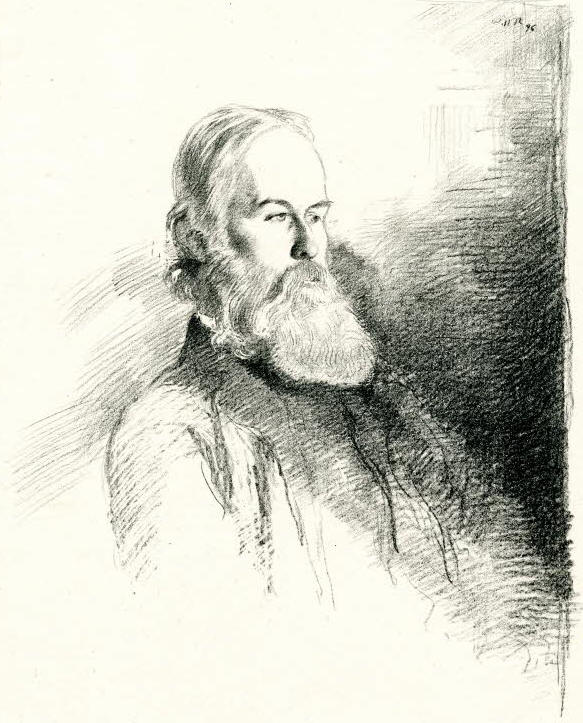

Queer Places:
University of Oxford, Oxford, Oxfordshire OX1 3PA
University of Cambridge, 4 Mill Ln, Cambridge CB2 1RZ
Rugby School, Lawrence Sheriff St, Rugby CV22 5EH,
UK
2 Woodstock Rd, Oxford OX2 6HT, UK
9 Fyfield Rd, Oxford OX2 6QE, UK
64 Woodstock Rd, Oxford OX2 6HR, UK
 Arthur Sidgwick (April 9, 1840 - September 25, 1920)
was an Oxford scholar, author of Introduction to Greek Prose Composition, a
standard text with many editions.
Arthur Sidgwick (April 9, 1840 - September 25, 1920)
was an Oxford scholar, author of Introduction to Greek Prose Composition, a
standard text with many editions.
He was the fouth son of William Sidgwick of Skipton, Yorkshire, clerk. He attended Trinity College, Cambridge, from 1861 to 1864, and was Second Classic in 1863. He was a chancellor's medallist and obtained a B.A. 1863. He was elected Fellow from 1864 to 1869, and again in 1882. He obtained a M.A. in 1866, and became lecturer and tutor from 1879 to 1882. He served as assistant master at Rugby School between 1864 to 1879. He entered Corpus Christy college on April 18, 1879, aged 39. He became a tutor in 1879 and a Fellow of Corpus Christi from 1882 to 1902, and a reader in Greek at Oxford from 1894 to 1906. He was a leader of the movement for admission of women to Oxford degrees.
He was the younger brother of Henry Sidgwick. He collaborated with his sister in law, Eleanor Mildred Sidgwick on a biography of his brother, "Henry Sidgwick: A memoir" (1906).
He married Charlotte Sophia Wilson (1853–1924), daughter of the Reverend Arthur Wilson, Vicar of Nocton in Lincolnshire, and they had three daughter and two sons. Their second daughter is Rose Sidgwick (Rugby, 1877- New York, 1918), a British university teacher and one of the founders of the International Federation of University Women. Another daughter was Ethel Sidgwick, author of Herself (1912). His second son Arthur Hugh Sidgwick, author of “Walking Essays” (1912) and ” The Promenade Ticket” (1914), was killed in action near Ypres on 17th September 1917. His other son Francis "Frank" Sidgwick (1879-1939) was a publisher, perhaps best remembered for his collaboration with Edward Marsh on Marsh's memoir of Rupert Brooke, and a selections from Brooke's poetry. He was also responsible for bringing out Brooke's first book, Poems, which Sidgwick and Jackson published on December 4, 1911.
Arthur Sidgwick died at his home, 64, Woodstock Road, Oxford, on September 25, 1920.
Sidgwick's diaries and other papers show how men like Sidgwick used ancient Greek to demarcate the boundaries of an elite male social, emotional, and educational sphere, and how that sphere became more porous at the turn of the twentieth century through processes such as university coeducation. Progressive dons like Sidgwick stood by women's equality in principle but were troubled by the potential loss of an exceptional environment of intense friendships forged within intellectually rigorous single-sex institutions. Several aspects of Sidgwick's life and his use of Greek exemplify these tensions: his marriage, his feelings about close male friends, his life as a college fellow, his work on behalf of the Oxford Association for the Education of Women, and his children's lives and careers.
John Addington Symonds took the view that this Platonic conception of desire, and the society in which they lived, meant that giving physical expression to the desire would be wrong. Symonds felt that F. W. Myers and Arthur Sidgwick had transgressed the boundary here. He wrote to Henry Graham Dakyns (1838-1911): 'You know that I consider the tone of F Myers to be redically wrong in matters of passion, & that I regret the peculiar colour of A S's erotics, not to speak of the misery wh I have myself suffered'. He had earlier expressed his doubts about Arthur's desires: "Is this eros Greek? No. If it were Greek is it what Plato would allow? No. Is it established in modern society? No. Is it what the world at large would call romantic, sentimental effeminate, on the verge of vice? Yes. Supposing the world wrong in a special instance, may not its general verdict be right? I think so. What is the source of Arthur's love? Is it intellectual sympathy? No. Is it moral good? No. Is it consentaneity of tastes? No. Is it chiefly aesthetical enjoyment & pleasure of a highly refined sensuousness? Yes. Are these likely to produce moral & intellectual strength? No. Are they capable of producing moral or intellectual debility? Yes, capable. What has yr experience been of this eros? That if uncontrolled it is evil. In all cases of possible harm, what does Duty say? Avoid all appearance of evil. Is this Duty increased or diminished by Arthur's position? Increased. In case moral injury were to accrue, where wd the evil fall most heavily? On the boy, & if on him then through him on his fellow boys. Does Arthur expose himself to external danger? Yes, to a very gt extent. These questions by no means settle or exhaust the matter. It is a case of an absolutely new casuistry. There is no rule by wh to measure it as yet."
My published books: